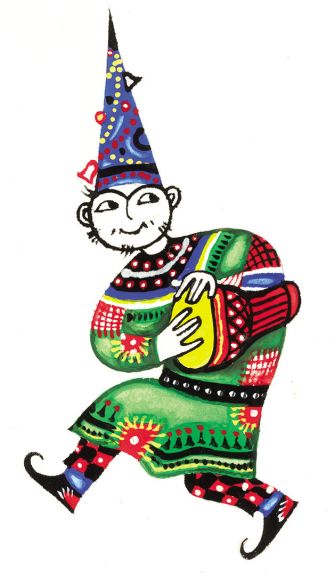About the author: Tahir Shahbazov works at the Institute of Archaeology and Ethnography of the Azerbaijan National Academy of Science and has written many articles on the ethnology of Azerbaijan
The Last Tuesday also involves a broad range of games, performances and rituals. The “ear divination” game has a deep educational, moral and psychological meaning. People, particularly young girls, take a cup of water, a mirror and a key, make a wish and approach their neighbours’ doors to discover if their wish will come true in the next year or not. They put their ear to the door, secretly listen in to conversations inside the house and interpret the first word they hear in relation to their wish. If there is a correlation between the words they hear and their wish, it means the wish will come true. As a result, on the Last Tuesday people try to talk positively in their homes, so that those listening in won’t get upset. The water encourages safe passage, the mirror - bright life and the key - that wishes will come true.
The Last Tuesday also involves a broad range of games, performances and rituals. The “ear divination” game has a deep educational, moral and psychological meaning. People, particularly young girls, take a cup of water, a mirror and a key, make a wish and approach their neighbours’ doors to discover if their wish will come true in the next year or not. They put their ear to the door, secretly listen in to conversations inside the house and interpret the first word they hear in relation to their wish. If there is a correlation between the words they hear and their wish, it means the wish will come true. As a result, on the Last Tuesday people try to talk positively in their homes, so that those listening in won’t get upset. The water encourages safe passage, the mirror - bright life and the key - that wishes will come true.
In Papaqatdı, young people knock at the door, throw their hats down and hide. The homeowner finds the hat, fills it with Tuesday gifts and places it back outside the door for its owner to come and collect it.
Marriageable girls carry out another ritual to test their fortune: they stand in front of their houses with their backs to the yard and throw their right shoes with their right hands back over the right shoulder. In the morning they look to see the position of the shoe on the ground; it is believed that if the toe is pointing towards the road and the heel towards the house the owner will soon receive good news, for example that they will get married.
One of the most interesting rituals is Danatma, mainly performed by young girls and boys, who gather in separate homes and have fun throughout the night with interesting conversations, stories and jokes and singing songs. But they mustn’t fall asleep. If someone falls asleep, their clothes will be sewn to the carpet as punishment for all the singing, chatting and dancing and their wishes won’t come true. By contrast, the first person to see the first signs of morning will have success in the new year.
During the game Xanbazama (“adorning the khan”) people gather in squares, dress the person chosen to play the khan and seat him on a throne. Two boys wave fans at him and a chosen vizier and advocate stand to his left and right. Appointed servants and an executioner dressed in red stand ready for the khan’s orders. The khan gives unusual orders which must then be carried out unconditionally. Kosa, the bald fool, tries to make the khan laugh through a series of funny acts. If the khan laughs, he is removed from the throne, thrown into water and a new khan is chosen. The performance lasts for hours.
Young people and children also enjoy games such as dasmalatdi (throwing kerchief), shalsallama(shaking the shawl), gurshagatdi (throwing the belt) and gurshagsallama (shaking the belt). Kosa-Kosa, Chovgan (polo), Fincan-Fincan (cups), Gashig oyunu (game with spoons) and clashing eggs.



Комментариев нет:
Отправить комментарий